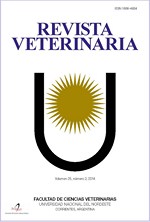Effect of conjugated linoleic acid on non enzymatic lipid peroxidation of mitochondria obtained from different rat tissues
DOI:
https://doi.org/10.30972/vet.1611983Palabras clave:
Conjugated linoleic acid, mitochondria, peroxidation, chemiluminescence.Resumen
The polyunsaturated fatty acid composition, chemiluminescence and peroxidizability index
of mitochondria obtained from rat liver, kidney, lung and heart, were studied after oral administration
of conjugated linoleic acid (CLA). After incubation of mitochondria in an ascorbate
Fe++ system (120 min at 37°C), it was observed that the total counts per min/mg protein originated
from light emission: chemiluminescence, was lower in liver and kidney mitochondria
in the CLA group than in the control group. When peroxidized mitochondrias were compared
to natives, in CLA and control groups it was observed that 18:2 n–6 decreased in all tissues
used in this work. In the control group, it also decrease C20:4 n–6 and C22:6 n–6 in kidney
and liver, while in lung it was affected C22:6 n–3. In CLA group, C20:4 n–6 decreased in
liver and kidney, whereas in liver it also decreased C22:6 n–3. As a consequence, the peroxidizability
index –a parameter based on the maximal rate of oxidation of fatty acids– showed
significant changes in liver and kidney mitochondria. These changes were less pronounced in
membranes derived from rats receiving CLA per os. Our results confirm and extend previous
observations that indicated that CLA may act as an antioxidant, protecting membranes from
deleterious effects.
Descargas
Descargas
Publicado
Cómo citar
Número
Sección
Licencia
Derechos de autor 2005 A. Palacios, V. A. Piergiacomi

Esta obra está bajo una licencia internacional Creative Commons Atribución-NoComercial 4.0.
Política de acceso abierto
Esta revista proporciona un acceso abierto inmediato a su contenido, basado en el principio de que ofrecer al público un acceso libre a las investigaciones ayuda a un mayor intercambio global de conocimiento. La publicación por parte de terceros será autorizada por Revista Veterinaria toda vez que se la reconozca debidamente y en forma explícita como lugar de publicación del original.
Esta obra está bajo una licencia de Creative Commons Reconocimiento-NoComercial 4.0 Internacional (CC BY-NC 4.0)










.jpg)
.jpg)



